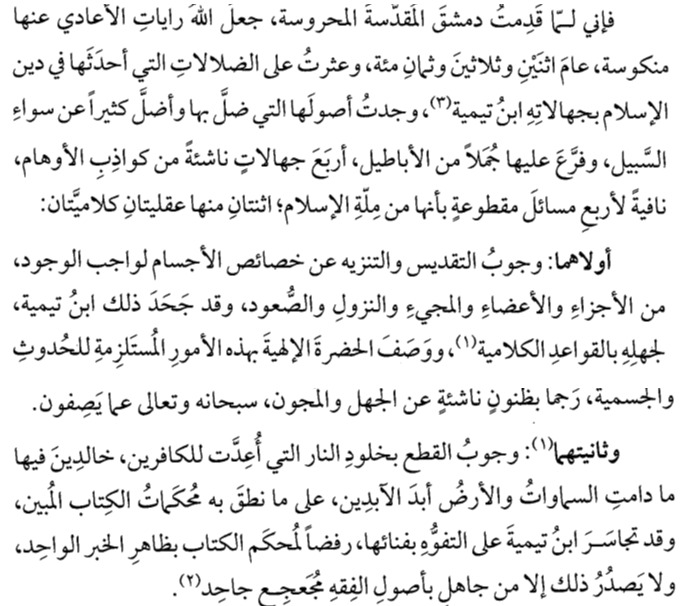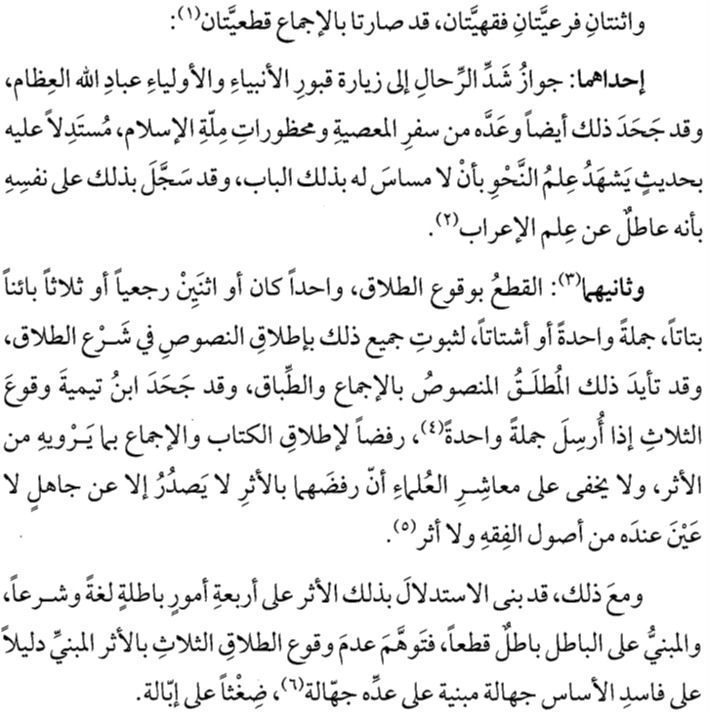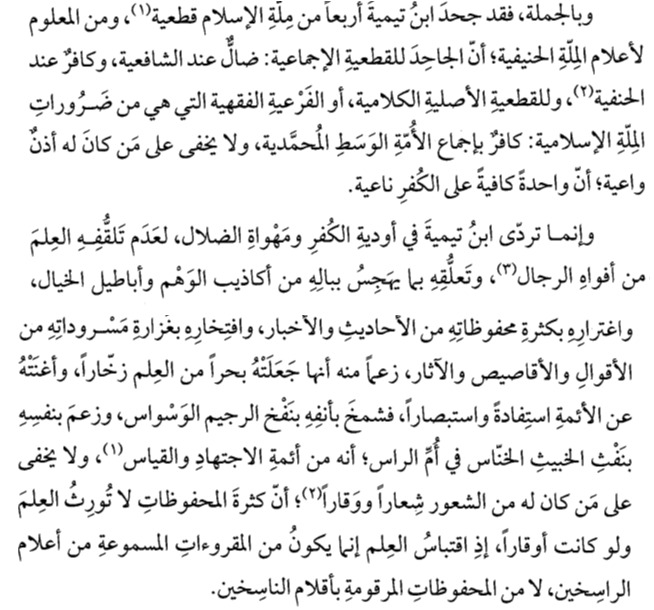‘Alā’ al-Dīn Muḥammad ibn Muḥammad al-Bukhārī al-Ḥanafī (779 – 841 AH) writes:
I arrived at the sacred, protected (city of) Damascus, may Allāh turn back the banners of enemies from it, in the year 832 AH and came across the deviations that Ibn Taymiyyah introduced into the religion of Islām by his ignorance.
I found their foundations – by which he became misguided and by which he misguided many from the straight path and from which he derived numerous falsehoods – to be four (beliefs of) ignorance derived from false fantasies. They negate four doctrines about which there is certainty in their being from the Islāmic religion. Two of them are rational theological issues.
The first is the necessity of deeming the Necessary Being pure and free of the characteristics of physical bodies, like components, parts, coming, going down and climbing up. Ibn Taymiyyah rejected this because of his ignorance of theological principles. He described the divine being with these descriptions which necessitate temporality and corporeality, throwing out assumptions that derive from ignorance and deviance. Exalted and glorified is Allāh from what they ascribe (to Him)!
The second is the necessity of having certainty in the eternality of the Hellfire which was prepared for disbelievers, in which they will reside for all eternity for as long as the heavens and earth go on, as pronounced by decisive (passages) of the Clear Book. Ibn Taymiyyah dared to say it would end, rejecting the decisive (passages) of the Book based on the apparent meaning of a singular report. This will only occur from someone ignorant of the principles of jurisprudence, a blustering rejectionist.
Two are derivative jurisprudential issues that have become categorical because of consensus.
The first is the permissibility of taking a journey to visit the graves of prophets and saints – exalted slaves of Allāh. He also rejected this and counted it as a sinful journey and something forbidden in the Islāmic religion, arguing for it from a ḥadīth that knowledge of grammar shows it as having no relationship with this topic. By this he registered himself as being bereft of the knowledge of grammar.
The second is having certainty in the occurrence of ṭalāq whether one or two that are revocable or three that are irrevocable and final, whether all in one or separated. All of this is established from the generality of the scriptural texts in the legislation of ṭalāq. This stated generality is supported by consensus and agreement. Ibn Taymiyyah rejected the occurrence of three (ṭalāqs) when it is pronounced all at once, rejecting the generality of the Book and consensus based on narrations he cited. It is obvious to scholars that rejecting them based on a report can only occur from an ignoramus having no grasp of the principles of jurisprudence nor the principles of ḥadīth.
Along with this, he premised his argument for this report on four false principles of language and law. Something premised on falsehood is definitely false. Thus supposing that three ṭalāqs do not occur based on a report, premised on a corrupt foundation as evidence, is ignorance premised on more ignorance – adding a handful of grass to a bundle of firewood [an Arabic proverb about compounded misfortunes].
In short, Ibn Taymiyyah has rejected four clear-cut things from the Islāmic religion. It is known to the luminaries of the monotheistic faith that the one who denies something decisive based on consensus is misguided according to the Shāfi‘īs and a disbeliever according to the Ḥanafīs, and one who denies something decisive from theology or derivative jurisprudential issues amongst the immediate necessities of the Islāmic religion is a disbeliever by the consensus of the balanced Muḥammadan Ummah. It is obvious to anyone with an aware ear that just one (such issue) is sufficient to pronounce disbelief.
Ibn Taymiyyah plummeted into the depths of disbelief and misguidance because he did not acquire knowledge from the mouths of men and was attached to the false fantasies and wrong imaginations that occurred in his mind. He was deceived by the great number of ḥadīths and reports he had memorised and was proud of the statements, narratives and accounts he could cite. He imagined they made him an abundant sea of knowledge and freed him from having to take benefit and insight from the authorities. He thus stuck his nose up as a result of the whispering accursed devil’s blow. He imagined himself to be from the authorities of ijtihād and qiyās because of the filthy withdrawing devil spitting into his brain. It is evident to anyone who has a degree of awareness that having memorised a lot does not generate knowledge, even if it is many loads (of knowledge). Knowledge is only acquired from the recited texts heard from the firmly-grounded luminaries, not from texts written by the pens of copyists that are memorised. (Muljimat al-Mujassimah, pp.35–41)
About the Author: ‘Alā’ al-Dīn Muḥammad ibn Muḥammad al-Bukhārī al-Ḥanafī (779–841 AH)
Alā’ al-Dīn al-Bukhārī, a distinguished scholar, grew up in Bukhara and undertook extensive travels in pursuit of knowledge. Guided by esteemed mentors, including his father and uncle, he culminated his studies under the renowned Sa‘d al-Dīn al-Taftāzānī. His erudition attracted the attention of the king of India during his residency in Kalaburagi, where he garnered great respect and admiration.
Subsequently relocating to Egypt, ‘Alā’ al-Dīn al-Bukhārī gained prominence as a scholar and teacher of Islāmic sciences. He had a strong disagreement with the Mālikī Qāḍī and insisted that the Mamlūk ruler either dismiss the Qāḍī or witness his departure from Egypt. Despite the Qāḍī’s repentance and the ruler thus deciding to keep him in office, ‘Alā’ al-Dīn al-Bukhārī stood firm in his decision to leave. After performing Ḥajj and a brief sojourn in Makkah, he established his residence in Damascus around 832 AH.
In Damascus, he penned works countering the ideologies of Ibn ‘Arabī, the Ṣūfī, and Ibn Taymiyyah. He passed away in Damascus and is buried in Mizzah. Numerous scholars and luminaries benefited from him. Proficient in fiqh, ‘aqīdah, Arabic, and taṣawwuf, he attracted a multitude of students in both Cairo and Damascus.


